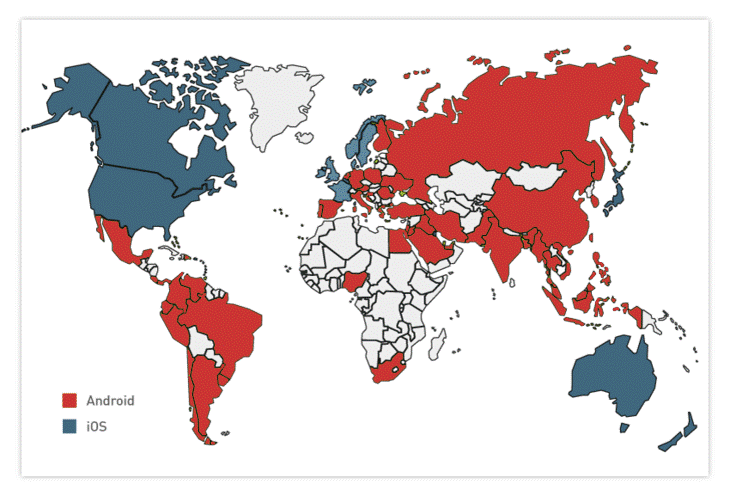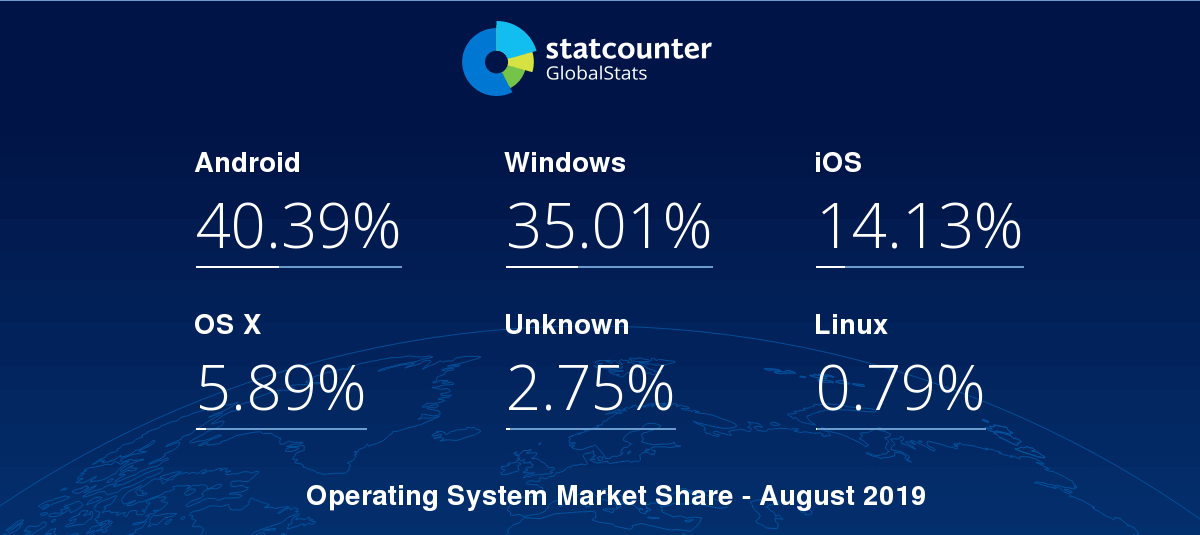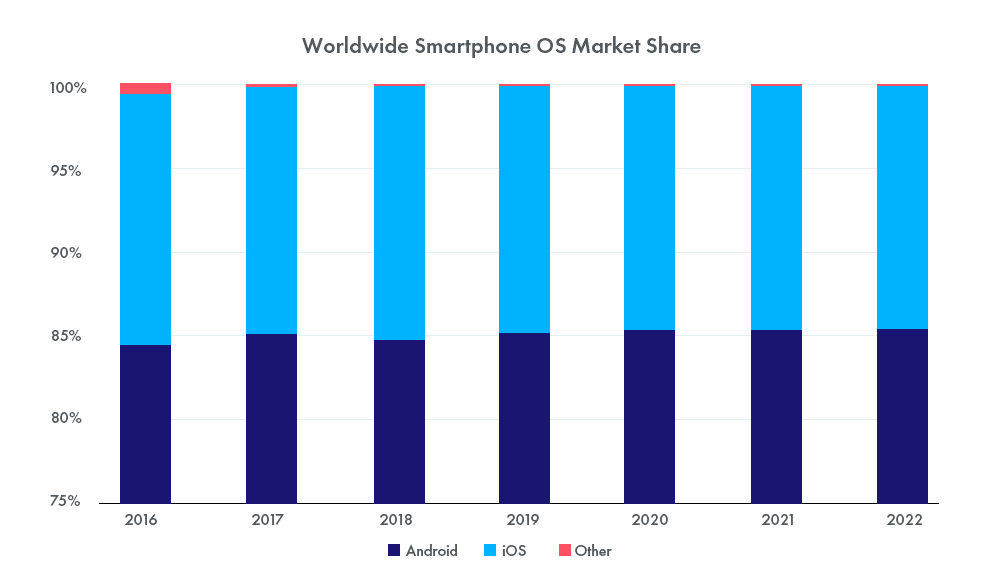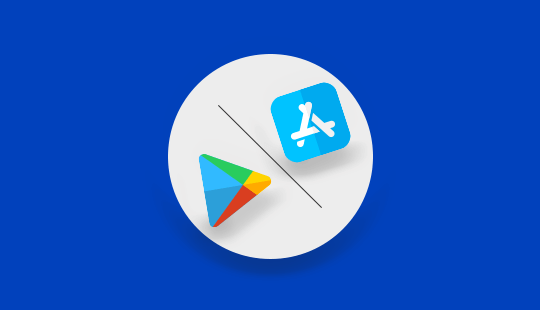New Startup comes with lots of unexpected challenges. As an entrepreneur, you have to find the most desirable solution for your business apps and Ideas. Although things get a lot simpler once you get an endorsement from a partner-like sound mobile app development agency, there are several possibilities that you need to understand for android App vs. iOS Application Development on your end.
Let’s begin looking at the smartphone or tablet (iPhone or Android) and app industry case scenario by looking at the basics of each situation today–several potential customers, app downloads, annual income, and customer retention.
Majorities Share By Countries For iOS vs. Android Development

In the global map, you can find the red color area is occupied by Android OS, and the iOS Ares holds blues color for the most popular mobile operating systems.
iPhone or Android? Smartphone Users Graph
According to Statcounter statically report, it will help you to evaluate the app demand level for the next time for android and iOS development.

If the answer to at least one of those questions is yes, you’ve come to the right place. I’ve got precisely the operating systems market share stats you need.
- Windows 10 has a desktop/laptop market share of 39.22%, making it the most popular desktop OS.
- 26% of Windows PCs still run Windows XP.
- macOS Mojave has a worldwide market share of 42.52% among Mac users.
- The current Linux desktop share is 1.74 – 2.18%.
- 85% of smartphones globally run on Android.
- iOS 12.1 has 55.39% of the market share.
- Windows Phone’s market share fell to a measly 0.1% in 2017
And here we are, again experiencing the market share race between Android and iOS. The competition is well-known. Android seems to be winning comfortably for now. We have Android with a market share of 85.41 $ versus iOS with 13.28 %. However, market competition indicates no signs of a halt shortly.
Data Sources: hostingtribunal.com
Android and iOS Market Share in the Year 2019 v 2018
While the international smartphone market is expected to shrink over again in 2019, IDC assumes that maybe the market can experience low single-digit growth from 2020 through the tip of its 2023 forecast.
The International Data Corporation (IDC) Worldwide Quarterly mobile tracker predicts that international smartphone shipments could decline through one.9 % to one.375 billion devices in 2019, down from one.402 billion in 2018. However, specialists think that the business can come to development within the last half of 2019, with revenues up one.4%. Within the long forecast, IDC expects the accumulative smartphone market to achieve one, 519 billion units shipped in 2023.

Android OS: According to CAGR Report, Android revenue is increased by 2.1% in the year 2019; also, they will expect new revenue to 1.32 billion in 2023. The ASPS (Average selling prices) is rising (5.8%) 269$ USA dollars in 2019, Up from 254$ USA dollars in 2018.
iOS OS: 2019 is anticipated to be another challenging year for fresh iPhone deliveries, with volumes expected to fall to 183.5 million, down 12.1% year-on-year. Apple is unlikely to deliver a 5 G handset in 2019 but, given that many telcos and markets are still struggling to work out the 5 G plan,
According to Images, it is showing a clear concept of application shopping performs at an individual level. This graph will help to choose to select who is perfect.
Worldwide Android vs. iOS: App Revenue and Downloads Statically
Buyers contributed approximately $25.5 billion globally to Apple’s App Store during the starting six months, a rise of 13.2 % year-over-year from $22.6 billion in Q1 and Q2 of 2018. The value generated by Apple’s Store was almost 80 % greater than Google Play’s anticipated gross earnings of $14.2 billion for the half. That was up 19.6 % Y/Y from the beginning share of 2018’s entirety of $11.8 billion.
Android vs. iOS: Which Platform Should Startups Go with as Their First App Choice
The response to which platforms should startups choose from iOS and Android is by no means a Yes or No style (and still the correct solution may turn out to be some of the worst mobile app development failures). There are several factors that entrepreneurs need to acknowledge while choosing.
Let’s see what those factors help determine which application startups should go with their first mobile app deployment–iPhone or Android.
Where is Your Audience going?
Even though Android occupies 80 % of the world’s mobile app market, some of the most likely revenue-generating nations like the US and Australia remain controlled by Apple. So if your market belongs to Western countries, accept the help of iPhone app designers. However, if the world is your target, go with Android developers.
Who is Your Application User?
The selection of application platforms goes beyond geographical boundaries. There is quite a range of functions that separate Android statistics from iOS populations. IOS users usually get a lot higher earnings, come with a greater education level, become more familiar with the app, and eventually get willing to spend a lot more on the app.
Android users, on the other hand, come with a share of their iconic characteristics. They probably fall within the 25-45 age group, are much more borrowing-conscious, tend to be late-technology fans, and are generally more impatient than Apple users (something that has changed in recent times).
In-app Purchases
If your app’s business strategy has an in-app purchase in the core, that would be easier to go to the App Store rather than the Google Play Store. While the estimated price per application user per month in the case of Apple is $1.08, the same number will also be decreased to $0.43. When it comes to in-app purchases, the difference could be seen at a regional level. World per user mobile expenditure is $0.50, Asia is $0.70, and North America, Europe, and Latin America are $0.61, $0.26, and $0.16, respectively.
Fragmentation
Thinking about fragmentation in terms of the variety of devices, the app would be able to reach, the one network that shines as an unparalleled champion is Android. Since Google has associated with a range of phone manufacturers, there are now thousands of devices running Android as opposed to IOS.
If you’re looking for a network that would help your venture become a megastar by introducing it to the masses without some specific group of people’s difficulty, Android app development will be your responsibility. But if having a reputation among a niche specialized user group is what you’re looking for, go with your team of iOS developers.
The Accessibility of Design & Development
The preferred option of companies–iOS vs. Android –the answer is different on both the Android and iOS platforms. Google Material Design has a more material impact on usability, and mobile app developers feel that when it comes to processing mobile apps. Swift is a much simpler language, to begin with, compared to Java.
However, design and development are surprising vital elements that reflect the platform and more on the expertise of your partner mobile app development agency. If you partner with a company that specializes in the development and Designee for Apple and Android devices, it doesn’t matter which platform needs less technical commitment than both ar.
Revenue After App on App Store or Play Store
We all are well aware that iOS applications are paid. Despite this, it has been noticed that in comparison to Android users, iOS users download more apps. With Android Apps moving mostly dependent on ad-support, the revenue generation for iOS app is much more beneficial in comparison to Android. According to a survey done in late 2015, the data collected by iOS applications is far more (45% more per consumer) in comparison to the one done by the Android app.
Therefore if gaining revenue is your principal focus and reaching the masses becomes another. In this match between iOS vs. Android, you may give iOS the first try. Also, according to a study, iOS users are 10% more likely to make in-app purchases in comparison to Android users.
The Cost of App Development
This is a vital point. Though at an initial level, the cost of building an application largely depends on the features you want to include. However, this might surprise you, but at a certain point, after comparing Android and iOS applications, Android apps are costly. The primary reason behind this is the large number of devices that the OS works for.
Apart from this, comparatively Android applications need more time to build due to the increase in several codes. The android applications are written in Java, which is a little more verbose when compared to Swift or Objective-C.
Release Cycles
In the case of Android, they have some restrictions with the partnered OEM devices. But in apple OS they never face this type of version issue. Because they have now hardware and software, so they have their right and rules.
Let us have a look at some of the facts and figures linked with the iOS vs. Android fight, which might help you choose one out of the two operating systems:
Read more: iOS 13 vs. Android Q
Case Study
Hare to give you several tips that will help you select the correct option between iOS and Android development specifically for your new app development idea or new Startup venture. So here are the most common questions and answers to them.
Question 1. Which platform should I choose to build an eCommerce app or create a delivery app?
Answer: iOS because its users have a higher income on average and spend more money on mobile apps.
Question 2. Which platform should I choose if I want to make money from in-app purchases?
Answer: iOS again due to the reasons mentioned above.
Question 3. Which platform is better to create a minimum viable product?
Answer: Many developers suggest using the iOS platform because it helps you to create your MVP faster and cheaper. On the other side, if you don’t have one, you’ll have to buy Mac and iPhone / iPad.
Question 4. Which platform should I choose if I want to make revenue from in-app ads?
Answer: Android, because it has twice as many users, who are more inclined to watch ads.
Question 5. Which platform is better for designing mobile games?
Answer: The mobile game’s highest app builds categories for Appstore, but on Android, the Game developer earns 90% revenue of a Play store, while in the case of iOS 70%. It means that Android has more preferable.
Android vs. iOS development seems to become even more robust. No doubt that every program has its ups & Downs. Moreover, if the one was excellent, why would we need the second?
We have listed below a popular topic to help with, which is most suitable for app development.
Benefits of Android App Development:
- More significant market;
- Higher extended app downloads;
- Faster and less restrictive publication process;
- Higher earnings from in-app ads.
Weaknesses of Android Development:
- Higher and more challenging to design apps due to fragmentation;
- More expensive;
- Android apps get less revenue on average;
- More potential bugs.
What About iOS?
Advantages of iOS App Development:
- More comfortable, faster, and competitive building process;
- Substantial business share in the USA and Europe;
- Brings more revenue on average;
- Apps have fewer bugs.
Weaknesses of iOS App Development:
- iOS has double fewer users;
- More challenging to publish an app;
- You will have to purchase Mac and iPhone or iPad;
- Apps bring less income from in-app ads.
So as of now, you can understand, there is no universal solution for any. You should think through all the pros & cons before making the final choice. We are sure you will get great success.
USS LLC has 7 + years of experience and 25+ Master iOS & Android App development team. We help you to convert your idea into reality. For Sales Related Enquiries Contact us on +1(678)720 4961 and Email Us On sales@universalstreamsolution.com.
Take your chance, and good luck!



